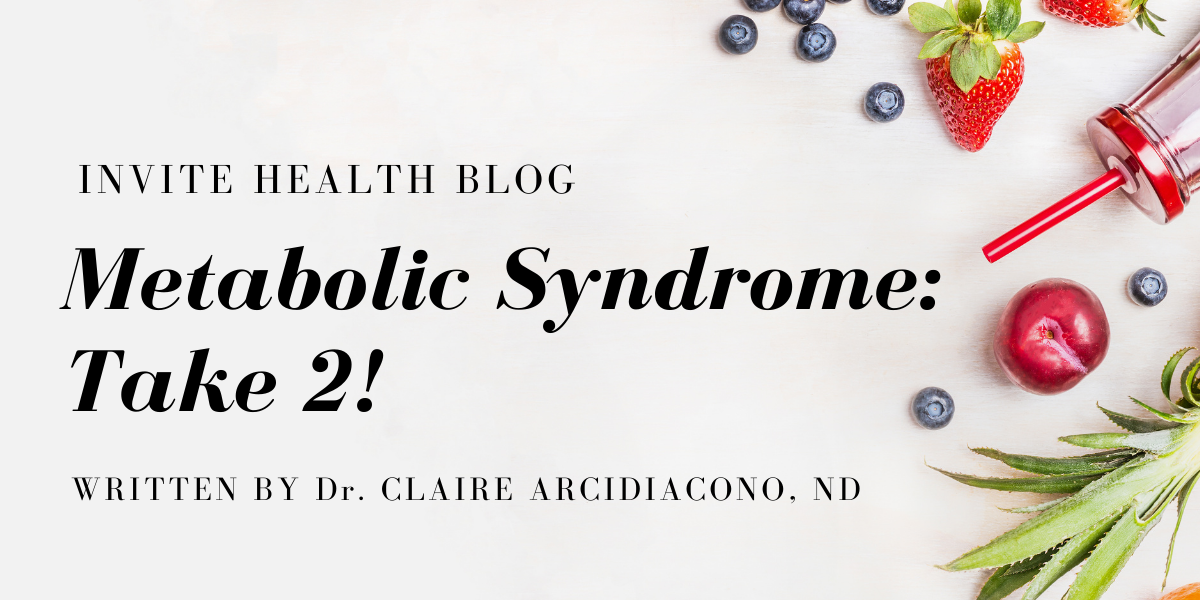Metabolic Syndrome: Take 2!

Written by: Claire Arcidiacono, ND
For further questions or concerns email me at [email protected]†
Last week I wrote about the individual parts of metabolic syndrome. But today we are going to take a step back and look at metabolic syndrome as a whole. As I previously said metabolic syndrome is diagnosed when 3 of the following chronic health concerns are present: abdominal obesity, high blood pressure, high triglycerides, and low HDL. (1) In the prior blog I listed all the risk factors for each individual component of metabolic syndrome. Since these risk factors were discussed in the last blog I won’t list them again however I did want to say that they do increase the likelihood of ending up developing metabolic syndrome. The general risk factors for metabolic syndrome include dietary factors, most importantly a high sugar diet including sugar-laden beverages. A western style diet that contains highly processed foods as well as foods high in trans fats is also a risk factor.
LIFESTYLE IMPACTS METABOLIC SYNDROME
Lifestyle concerns that increase the risk of metabolic syndrome include being sedentary/ having low physical activity, excessive alcohol intake, as well as poor sleep/ and high stress levels. Increased age has also been found to be a risk factor for metabolic syndrome.
INFLAMMATION
There is also evidence that the presence of inflammation which is indicated by the presence of inflammation markers such as C-reactive protein, fibrinogen, interleukin 6, TNF alpha are signs that the individual has a higher risk of metabolic syndrome.
AUTOIMMUNE DISEASES
Certain autoimmune disease’s such as psoriasis and psoriasis arthritis are associated with metabolic syndrome. In those with chronic pulmonary disease (COPD) metabolic syndrome is found in up to 50% of patients. More research is needed to determine if the metabolic syndrome caused the COPD or if the COPD lead to the metabolic syndrome. Genetics also appear to be a risk factor. (2)
COMPLICATIONS
Metabolic syndrome potentially has all the complications of its individual components. Specifically it also has its own severe complications. These complications can include type 2 diabetes, cardiovascular diseases, strokes, kidney disease, and nonalcoholic fatty liver disease. Other potential complications can include hyperuricemia or increased uric acid, PCOS, erectile dysfunction and acanthosis. (3)
As I have previous stated the diagnosis criteria for metabolic syndrome is the presence of any 3 of the 5 preexisting conditions. For the diagnosis criteria for each of the 5 medical conditions please see my prior blog.
MANAGEMENT
Management of metabolic syndrome requires a multi fascinated approach. Some of the preexisting conditions require treatment that works rapidly. For example in the case of high blood pressure side effects of extremely high blood pressure can include stroke. In this case while supplements can be helpful to work with medications they do not replace needed proscription medications. Diet, lifestyle and even certain medications a long with the following medications can all help manage metabolic syndrome.
ICYMI: METABOLIC SYNDROME>>READ NOW!
SOLUTIONS & SUPPORT
A Mediterranean diet has been found in studies to help with the different aspects of metabolic syndrome including high blood pressure, high triglycerides, obesity and high blood sugar. (4)
Lifestyle changes that can help with metabolic syndrome include reducing alcohol intake, reducing sugar intake, increasing activity. (5)
Reducing stress is also helpful! L-theanine (6) and Hemp (7) have both been found to help reduce stress levels as well as help with sleep! Phosphatidylserine has been found to reduce cortisol levels which as we all know is the stress hormone. (8). for these products please see Invite’s L theanine, Phosphatidylserine and our varied Hemp/CBD products!
Reducing high blood pressure is very important.
Studies show that Hawthorne is effective at lowering blood pressure after 12 weeks. (9) In addition to helping with blood sugar (see my prior article on diabetes type 2) Magnesium is proving its worth as it also helps with blood pressure! Studies find it to be very helpful in lowering blood pressure. (10) Very similar to magnesium in that according to studies is found to help both blood sugar and high blood pressure is grape seed! (11) In studies both cocoa (12) and beets (13) have been found to help lower blood pressure! For these products please look at Invite’s Cardio Hx, Normo-Tensive, Grape Seed Extract, and Daily Multivitamin with Grape Seed, Cocoa Hx, Beets Hx and our extensive line of magnesium products!
Abdominal obesity is mostly addressed with diet however there are things that can be helpful! Studies have found green tea to be helpful with combating abdominal obesity. (14) Additionally since Phosphatidylserine helps lower cortisol hypothetically it can help abdominal obesity. (8) See Invite’s Green Tea TX, Green Tea Hx and Green Tea Fat Burner!
Triglycerides can be lowered by both omega 3s (15) and reducing sugar in the diet. (16) See Invite’s fish oil and Krill oil!
In addition to lowering triglycerides omega 3s can also increase HDL! (17)
Please see my diabetes type 2 blog for helpful hints on managing type 2 diabetes!
DIABETES TYPE 2>>READ NOW!
Next week we will delve into other forms of high blood sugar such as gestational diabetes, stress induced high blood sugar, “type 3 diabetes” and lastly drug induced high blood sugar.
REFERENCES
1.”Metabolic syndrome”. Mayo Clinic. Retrieved 10 Sep 2020.
2.Chan SM, Selemidis S, Bozinovski S, Vlahos R (June 2019). “Pathobiological mechanisms underlying metabolic syndrome (MetS) in chronic obstructive pulmonary disease (COPD): clinical significance and therapeutic strategies”. Pharmacol Ther. 198: 160–188. doi:10.1016/j.pharmthera.2019.02.013. PMC 7112632. PMID 30822464.
3.”Metabolic Syndrome: Risk Factors, Diagnosis, and More”. Healthline. 2022-01-28. Retrieved 2022-03-31.
4.https://www.ncbi.nlm.nih.gov/pmc/articles/PMC5352455/
5.https://www.ncbi.nlm.nih.gov/pmc/articles/PMC5377429/
6.https://www.ncbi.nlm.nih.gov/pmc/articles/PMC6836118/
7.https://www.ncbi.nlm.nih.gov/pmc/articles/PMC6326553/
8.https://www.ncbi.nlm.nih.gov/pmc/articles/PMC2503954/
9.https://www.sciencedirect.com/science/article/abs/pii/S2212958817301106
10.https://pubmed.ncbi.nlm.nih.gov/22051430/
11.https://www.ncbi.nlm.nih.gov/pmc/articles/PMC5370781/
12.https://pubmed.ncbi.nlm.nih.gov/28439881/
13.https://www.ncbi.nlm.nih.gov/pmc/articles/PMC6316347/
14.https://www.ncbi.nlm.nih.gov/pmc/articles/PMC8910422/
15.https://pubmed.ncbi.nlm.nih.gov/33720044/
16.https://www.wellrx.com/news/reducing-sugar-to-control-triglycerides-and-cholesterol-levels/
17.https://www.ncbi.nlm.nih.gov/pmc/articles/PMC5827911/#:~:text=Omega%2D3%20PUFAs%2C%20especially%20DHA,and%20VLDL%2C%20and%20increases%20HDL.


